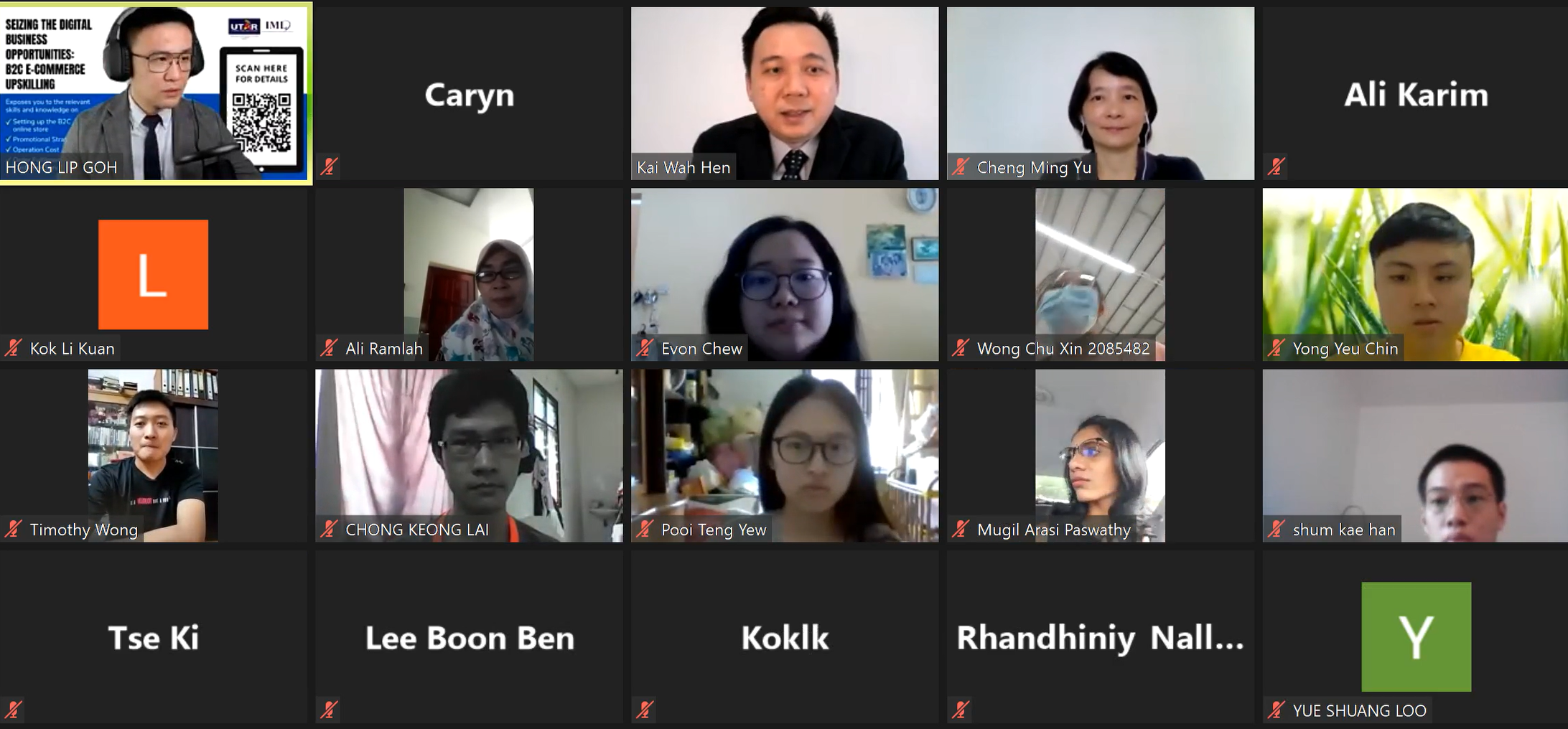
.png)
Dr
Hen sharing his knowledge during the webinar
Realising the importance of e-commerce in the economy sector, the
Institute of Management and Leadership Development (IMLD) organised a
webinar on “Uplifting business digitally: An exploration with e-Commerce” on
10 April 2021, via Zoom to assess the current e-commerce market, while
understanding the different types of e-commerce business models. The webinar
also aimed to explore the opportunities offered by e-commerce during the
Covid-19 pandemic and to recognise the emerging and future trends of
e-commerce.
The webinar, which saw more than 120 participants, was presented by
Faculty of Accountancy and Management
(FAM) Deputy Dean for Academic Development and Undergraduate Programmes Dr
Hen Kai Wah who is a certified trainer and lecturer for the Alibaba Global
Digital Talent programme. The webinar session was moderated by FAM lecturer
Dr Goh Hong Lip.
.png)
Dr
Hen explaining the e-commerce ecosystem
“Prior to 1994, e-commerce did not even exist. Fast forward to 2021, global
online sales are forecasted to reach 22 per cent of all retail sales in
2023. By 2040, 95 per cent of retail purchases are likely to be made online
and traditional retail may hardly exist. Currently, China has the largest
e-commerce market in the world. As of 2021, there are 2.14 billion global
digital buyers which can be translated to 27.2 per cent of the world
population and these numbers are still growing day by day. Thus, the key
takeaway is that with more people shopping online each year, there has never
been a better time to start an online store,” Dr Hen explained.
“E-commerce can be defined as an economic activity that occurs online. It
includes buying, selling and exchanging products, services and information
over the internet. It also involves the use of the internet, the web and
mobile apps to transact business. E-commerce refers to buying and selling
online, involving financial transaction while e-business encompasses all
business conducted online which include the inventory management, email
marketing, content management system, big data and data mining as well as
business processes,” said Dr Hen.
Dr
Hen also shared the projected global retail e-commerce sales in 2020, top
ten countries ranked by retail e-commerce sales, e-commerce activity
overview, consumer goods e-commerce in Malaysia, percentage of e-commerce
adoption in various countries, differences between e-commerce and e-business
and other related topics. “The types of e-commerce are such as
business-to-business (B2B), business-to-consumer (B2C), consumer-to-business
(C2B), consumer-to-consumer (C2C), government-to-government (G2G),
government-to-business (G2B), peer-to-peer (P2P), business-to-employee
(B2E), online-to-offline or offline-to-online (O2O), mobile commerce, social
commerce and location commerce,” added Dr Hen.
.png)
e-Commerce players in Malaysia
The few unique features of e-commerce technology are ubiquity, global reach,
universal standard, social technology, personalisation customisation,
information density, interactivity and richness. E-commerce helps to
overcome geographical limitations, lower costs, locate product quickly
through search engines, eliminate travel time and cost, provide comparison
shopping, enable deals, bargains, coupons as well as group buying and
provide rich information. Aside from that, it remains open all the time and
it creates markets for niche products. “Some of the emerging trends are
Digital Free Trade Zone (DFTZ), power of social influencer or better known
as key opinion leader, online-to-offline, innovative delivery tools, big
data and augmented reality shopping. It is time to start uplifting your
business digitally via e-commerce now,” advised Dr Hen.

Dr
Goh (top row, far left), Dr Hen (top row, middle) and IMLD Director Prof Dr
Cheng Ming Yu (top row, second from right) with the participants during
group photography session
Wholly owned by UTAR Education Foundation (200201010564(578227-M)) LEGAL STATEMENT TERM OF USAGE PRIVACY NOTICE